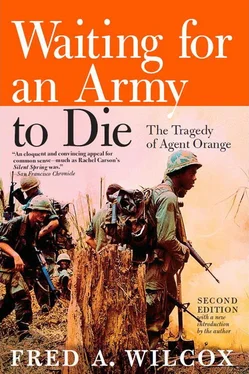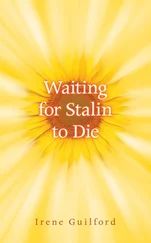“In December 1968 a hill, a ridge, was sprayed by helicopters. Again, we thought it was nerve gas. And Phantom jets strafed the hill with napalm, causing gas and a lot of smoke. I’m told now—I didn’t understand it then—that this causes more dioxin to be present.
“I sweat all the time, my hands and feet. My joints are always sore. I have chronic diarrhea. In general, I consider myself a physical wreck. And I am thirty-three years old. I feel like I am sixty years old.” 13
Had they been willing to listen, VA officials would have heard a former aircraft crew chief announce: “I am compelled to testify because I probably won’t be alive for the next meeting of the Commission.
“I was exposed approximately twenty to thirty times of flying through the mists… There was heavy defoliation in that area for a whole month. We were getting mists practically every day, coming into the compound. I had no health problems prior to my service time, and I was healthy up until six years after I left the army. In 1975 I suddenly became ill, and I went to see doctors. I had $12,000 in medical expenses. I spent all my savings…
“No diagnosis was ever reached. I was forced to go to the VA for help. I stayed in the VA hospital for two and a half months. The doctors told me it was my gall bladder and I should have an operation.
“I went through an exploratory laparotomy, in which they removed my gall bladder, they removed part of my spleen, and they also removed my appendix.
“They had told me that if I underwent this operation, I would be okay. After the operation I was sicker than before, and the doctor, my surgeon, came and told me after the operation that my liver didn’t look so good. He couldn’t tell me at that time what it was.
“When a biopsy came back, it came back as nonspecific hepatitis. I asked the doctor what that meant. He told me, that means you have a liver disease, that nobody knows what it is.
“Between 1975 and the present time I have been over three and a half years in the VA hospital in Brooklyn. I get terrible pains in my right-hand side. I have lost over fifty pounds. I get nausea, vomiting; I can’t keep anything down.
“In 1978 I also developed chronic idiocrasy and pancreatitis. I am getting worse and worse, and the VA cannot figure out what to do.
“Now they tell me I have priority treatment. Priority treatment doesn’t mean anything to me because medical science doesn’t even know how to deal with my illness, an illness that’s never been seen before. But it’s not so unusual to me because all the years that I spent in the hospital, there have been other Vietnam veterans who have liver diseases that are also undiagnosable. They are unable to come here today because they are too sick to even get out of bed.
“So I think that we need medical help, but I would also like to stress the fact that these poisons that were dealt out in Vietnam, they have created diseases that medical science cannot even deal with today. There is no treatment for me. There is medicine that can only relieve my pain and try to help my symptoms, but there is no treatment that is going to help me get well. I am going to continue to deteriorate until I die.” 14
And the Veterans Administration or congressional committees would have heard Vietnam veterans and their wives testify that their treatment at VA hospitals had been anything but dignified and compassionate. They would have heard that following cursory physicals, which veterans had been led to believe were “comprehensive Agent Orange examinations,” they had waited weeks, even months, for the “results,” only to be informed the problem was “all in their head” and to be given a public relations packet that, said one veteran, “told you Agent Orange had saved your life so don’t worry about it.” VA officials would have heard a veteran testify that, unable to treat a fungus-like growth on his scrotum with over-the-counter remedies, he had visited the VA clinic, where a doctor ordered him to “drop his pants” and, without administering even a local anesthetic and using an unsterilized scalpel, proceeded to remove the fungus “as though he were scaling a fish.” The VA hierarchy would have heard, as I did at New York State’s public hearing on dioxin exposure, seemingly endless stories of abuse, neglect, incompetence, arrogance, faulty diagnosis, altered records, and ordinary stupidity.
But perhaps the most disturbing thing these officials would have heard was that as the number of Vietnam veterans applying for disability increased, regional VA hospitals frequently resorted to a strategy perfected by totalitarian governments to silence dissidents. The dissident, in this case, is a veteran asking to be examined for bladder or liver cancer, who instead is given a psychiatric examination. Dissent is the desire to be seen as a rational human being with a genuine, urgent medical problem, rather than as a traumatized guerrilla fighter whose problem is postwar confusion. Had the VA been willing to listen, its medical staff would have heard veterans expressing their outrage at being treated as children, neurotics, and con artists.
“Why,” demanded a veteran at the New York State dioxin hearings, “is every Vietnam veteran given a psychiatric examination first? Or, if you are admitted to the hospital, it is always under a psychiatric guise. Why can no proper diagnosis be made? Men have a history of a multitude of psychological, organic, and/or neurological problems that are not being assessed or documented properly at the Veterans Administration. They are denying men their rights. They are committing a crime. They are violating the Federal Code of Regulations, Title 8, as it is. And doctors are violating their code of ethics.” 15
On February 21, 1980, Max Cleland, testifying before the Committee on Veterans’ Affairs, US Senate, answered the question about the VA’s penchant for seeing Vietnam veterans’ problems as “psychological.” After telling the committee that Vietnam veterans had a lower unemployment rate than the US population as a whole, were going to school, buying homes, and thanks to the concern and generosity of the Veterans Administration, generally adjusting rather nicely to civilian life, Cleland said: “Vietnam era veterans are utilizing VA outpatient health care facilities at about the same rate as veterans of other wars but have a lower rate of hospitalization due to their younger age when compared to veterans of other wars. As may be expected with younger veterans, those Vietnam era veterans treated have relatively fewer physical medical problems than do older veterans and, conversely, as a result for those treated, their care is more apt to be for psychiatric disorders. Of those VEVs [Vietnam era veterans] discharged from VA hospitals during FY 1979, 46 percent had received care for psychiatric disorders, including alcohol and drug abuse.” 16
There can be little doubt that being sent to war as a hero only to be greeted upon one’s return home as a pariah has angered, frustrated, and confused many veterans. Nor would anyone deny that the horrors of guerrilla warfare have taken their toll on veterans of America’s longest and most unpopular war. But in its attempt to invalidate the veterans’ claims for service-connected disability, the VA has resorted all too frequently to labeling the symptoms of dioxin exposure as just one more example of “post-Vietnam syndrome.” A veteran in his early thirties who is told that his ailments are incurable and who is then turned down for disability payments is very likely to experience depression, and sleep disturbances, and other symptoms commonly associated with his tour of duty in Vietnam. By arguing that the sudden weight loss, chronic skin rashes, migraine headaches, gastrointestinal pains that thousands of Vietnam veterans have complained of are symptomatic of a collective neurosis, the VA is attempting to place veterans who were exposed to Agent Orange in a no-win situation. Ironically, the VA would have veterans believe that whatever ails them can be traced directly to their experience in Asia, just as long as that experience does not include exposure to toxic herbicides.
Читать дальше











